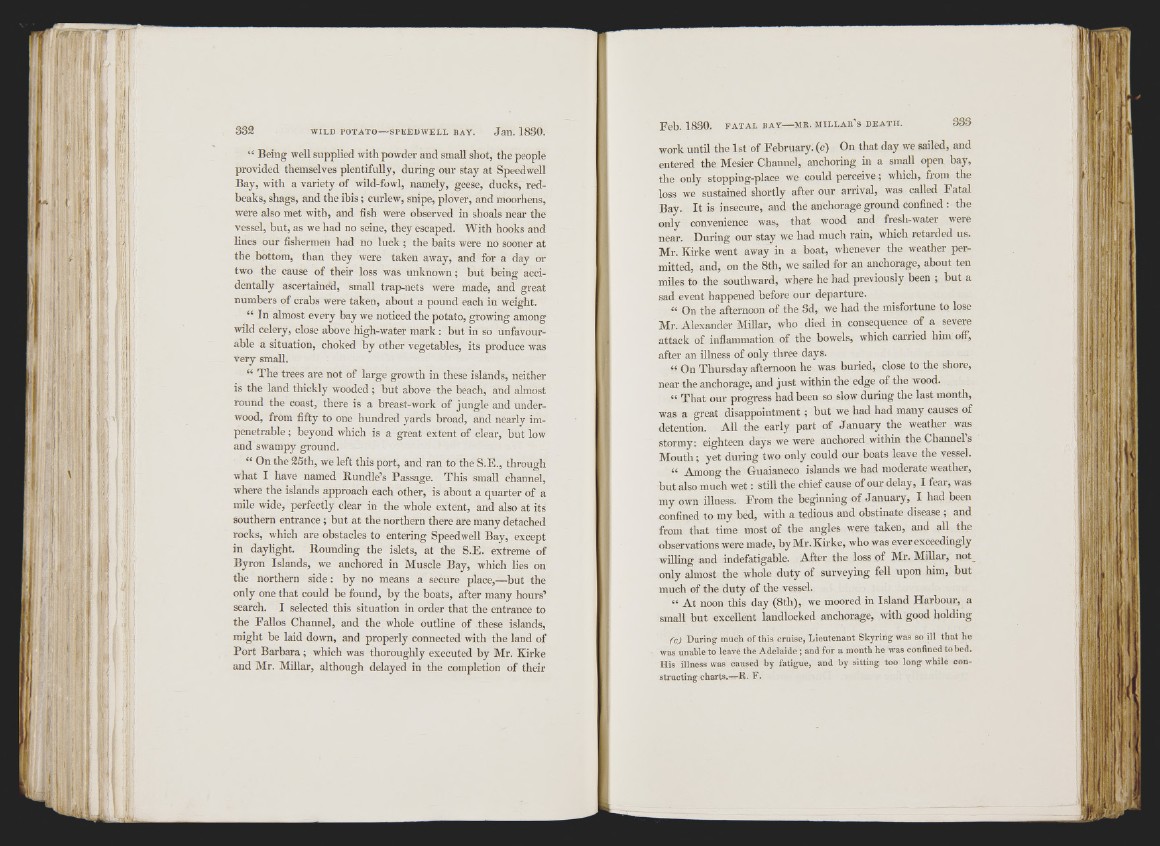
! I
, ' .
l i i i
i" ‘j
I . l i
.1
I'
■ S
■iH
ft' ■'
I ■! '
i
H i
to 1
!t
“ Being well supplied with powder and small shot, the people
provided themselves plentifully, during our stay at Speedwell
Bay, with a variety of wild-fowl, namely, geese, ducks, red-
beaks, shags, and the ibis; curlew, snipe, plover, and moorhens,
were also met with, and fish were observed in shoals near the
vessel, but, as we had no seine, they escaped. With hooks and
lines our fishermen had no luck ; the baits were no sooner at
the bottom, than they were taken away, and for a day or
two the cause of their loss was unknown; but being accidentally
ascertained, small trap-nets were made, and great
numbers of crabs were taken, about a pound each in weight.
“ In almost every bay we noticed the potato, growing among
wild celery, close above high-water mark : but in so unfavourable
a situation, choked by other vegetables, its produce was
very small.
“ The trees are not of large growth in these islands, neither
is the land thickly wooded ; but above the beach, and almost
round the coast, there is a breast-work of jungle and underwood,
from fifty to one hundred yards broad, and nearly impenetrable
; beyond which is a great extent of clear, hut low
and swampy ground.
“ On the 25th, we left this port, and ran to the S.E., through
what I have named Bundle’s Passage. This small channel,
where the islands approach each other, is about a quarter of a
mile wide, perfectly clear in the whole extent, and also at its
southern entrance ; but at the northern there are many detached
rocks, which are obstacles to entering Speedwell Bay, except
in daylight. Bounding the islets, at the S.E. extreme of
Byron Islands, we anchored in Muscle Bay, which lies on
the northern side: by no means a secure place,—but the
only one that could be found, by the boats, after many hours’
search. I selected this situation in order that the entrance to
the Fallos Channel, and the whole outline of these islands,
might be laid down, and properly connected with the land of
Port Barbara; which was thoroughly executed by Mr. Kirke
and Air. Millar, although delayed in the completion of their
work until the 1st of February, (c) On that day we sailed, and
entered the Mesier Channel, anchoring in a small open bay,
the only stopping-place we could perceive; which, from the
loss we sustained shortly after our arrival, was called Fatal
Bay. It is insecure, and the anchorage ground confined ; the
only convenience was, that wood and fresh-water were
near. During our stay we had much rain, which retarded us.
Mr. Kirke went away in a boat, whenever the weather permitted,
and, on the 8th, we sailed for an anchorage, about ten
miles to the southward, where he had previously been ; but a
sad event happened before our departure.
“ On the afternoon of the 3d, we had the misfortune to lose
Mr. Alexander Millar, who died in consequence of a severe
attack of inflammation of the bowels, which carried him off,
after an illness of only tlu'ee days.
“ On Thursday afternoon he was buried, close to the shore,
near the anchorage, and just within the edge of the wood.
“ That our progress had been so slow during the last month,
was a great disappointment ; but we had had many causes of
detention. All the early part of January the weather was
stormy: eighteen days we were anchored within the Channels
Mouth; yet during two only could our boats leave the vessel.
“ Among the Guaianeco islands we had moderate weather,
but also much wet: still the chief cause of our delay, I fear, was
my own illness. From the beginning of January, I had been
confined to my bed, with a tedious and obstinate disease ; and
from that time most of the angles were taken, and all the
observations were made, hy Air. Kirke, who was ever exceedingly
willing and indefatigable. After the loss of Air. Millar, not
only almost the whole duty of surveying fell upon him, but
much of the duty of the vessel.
“ At noon this day (8th), we moored in Island Harbour, a
sTuall but excellent landlocked anchorage, with good holding
f'cj During much of this cruise, Lieutenant Skyring was so ill th a t he
was unable to leave the Adelaide ; and for a month he was confined to bed.
His illness was caused by fatigue, and by sitting too long while constructing
charts.—R. F .
I''